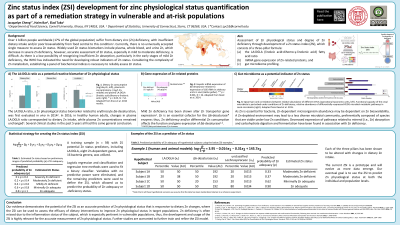Back

Objectives: Accurate assessment of zinc (Zn) physiological status and degree of Zn deficiency through development of a Zn status index (ZSI), which consists of a three-pillar formula: (1) the LA:DGLA (linoleic acid:dihomo-γ-linolenic acid) ratio, (2) mRNA gene expression of Zn-related proteins, and (3) gut microbiome profiling.
Methods: Five in vivo studies were selected on the basis that the studies utilized diet-controlled experiments with differential Zn content and determined how differential dietary Zn could affect the parameters used in the ZSI. A training sample from the studies (n = 59) with a total of 25 potential Zn status predictors, including LA:DGLA, eight Zn-dependent genes, and 16 bacteria genera, was utilized for ZSI prototype development. Logistic regression and classification and regression tree (CART) methods were used to fit a binary classifier using these 25 variables as predictors for Zn status, where variables with no predictive power were eliminated. The remaining predictors were used to define our ZSI, which allowed us to predict the probability of Zn-adequacy or -deficiency status.
Results: The ZSI provided a clear and accurate measurement of Zn physiological status. A decreased LA:DGLA level was associated with an improvement in Zn status. Δ6-desaturase gene expression was significantly altered with differential dietary Zn consumption. Bacterial abundance of the Lachnospiraceae family was altered based on level of Zn adequacy, where the ZSI found bacteria of this family to have significant predictive power.
Conclusions: Our evidence demonstrates the potential of the ZSI as an accurate predictor of Zn physiological status that is responsive to dietary Zn changes, where the ZSI can be used to assess the efficacy of dietary interventions to improve Zn status in target populations. Zn deficiency is often missed due to the inflammation status of the subject, which is especially pertinent in vulnerable populations, thus, the development and usage of the ZSI is highly relevant for the accurate measurement of Zn physiological status - further studies are warranted to further train and refine the ZSI model.
Funding Sources: Not applicable
Vitamins and Minerals
(PO30-04-22) Zinc Status Index (ZSI) Development for Zinc Physiological Status Quantification as Part of a Remediation Strategy in Vulnerable and At-Risk Populations

- JC
Jacquelyn Cheng, MS
– PhD Student, Cornell University, Ithaca, New York, United States - HB
Haim Bar, Ph.D.
– University of Connecticut - ET
Elad Tako, PhD
– Professor, Cornell University, Ithaca, New York, United States
Presenting Author(s)
Co-Author(s)
Disclosure(s):
Jacquelyn Cheng, MS: No relevant financial relationship(s) with ineligible companies to disclose.
Objectives: Accurate assessment of zinc (Zn) physiological status and degree of Zn deficiency through development of a Zn status index (ZSI), which consists of a three-pillar formula: (1) the LA:DGLA (linoleic acid:dihomo-γ-linolenic acid) ratio, (2) mRNA gene expression of Zn-related proteins, and (3) gut microbiome profiling.
Methods: Five in vivo studies were selected on the basis that the studies utilized diet-controlled experiments with differential Zn content and determined how differential dietary Zn could affect the parameters used in the ZSI. A training sample from the studies (n = 59) with a total of 25 potential Zn status predictors, including LA:DGLA, eight Zn-dependent genes, and 16 bacteria genera, was utilized for ZSI prototype development. Logistic regression and classification and regression tree (CART) methods were used to fit a binary classifier using these 25 variables as predictors for Zn status, where variables with no predictive power were eliminated. The remaining predictors were used to define our ZSI, which allowed us to predict the probability of Zn-adequacy or -deficiency status.
Results: The ZSI provided a clear and accurate measurement of Zn physiological status. A decreased LA:DGLA level was associated with an improvement in Zn status. Δ6-desaturase gene expression was significantly altered with differential dietary Zn consumption. Bacterial abundance of the Lachnospiraceae family was altered based on level of Zn adequacy, where the ZSI found bacteria of this family to have significant predictive power.
Conclusions: Our evidence demonstrates the potential of the ZSI as an accurate predictor of Zn physiological status that is responsive to dietary Zn changes, where the ZSI can be used to assess the efficacy of dietary interventions to improve Zn status in target populations. Zn deficiency is often missed due to the inflammation status of the subject, which is especially pertinent in vulnerable populations, thus, the development and usage of the ZSI is highly relevant for the accurate measurement of Zn physiological status - further studies are warranted to further train and refine the ZSI model.
Funding Sources: Not applicable

.png)
